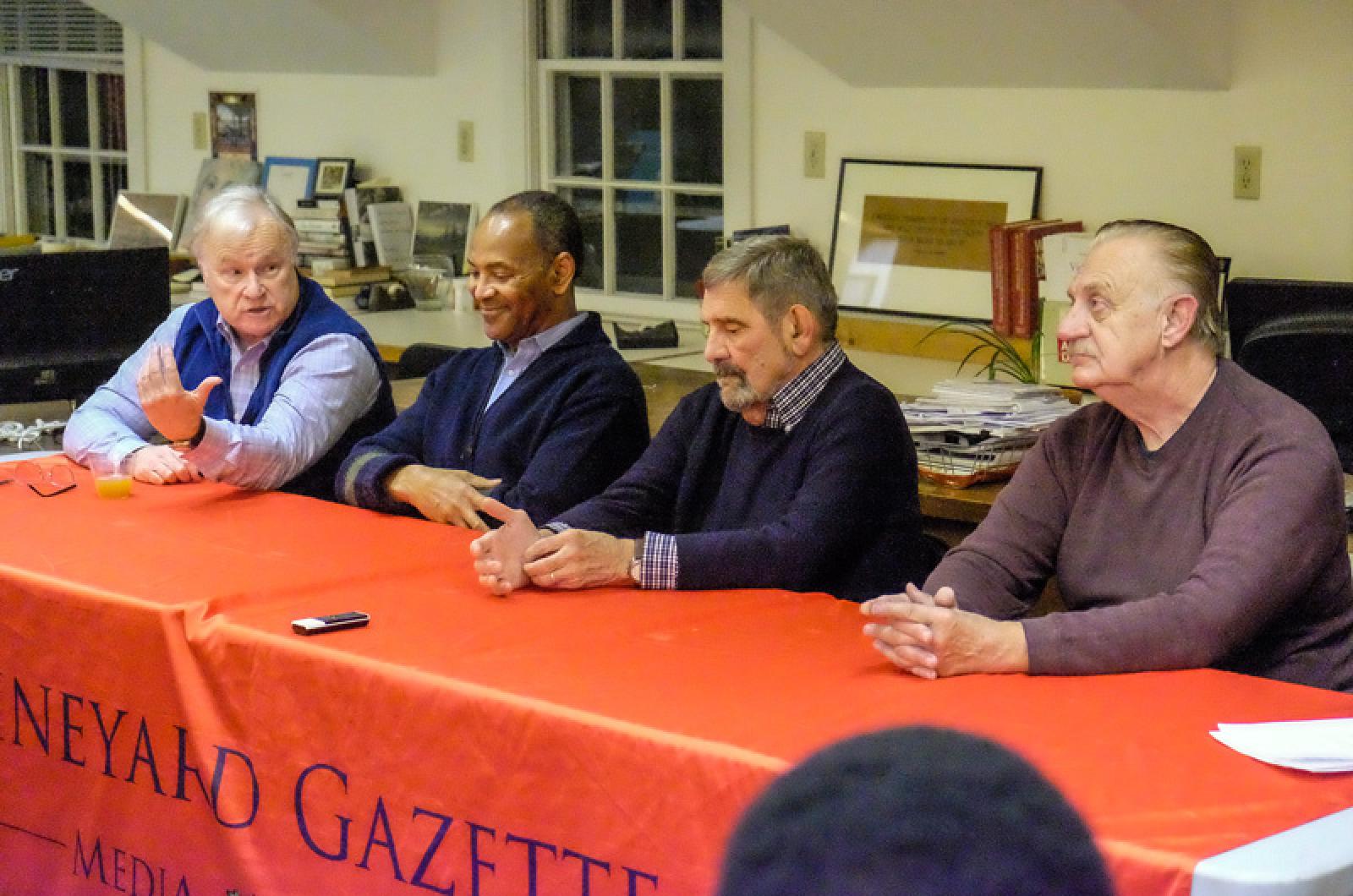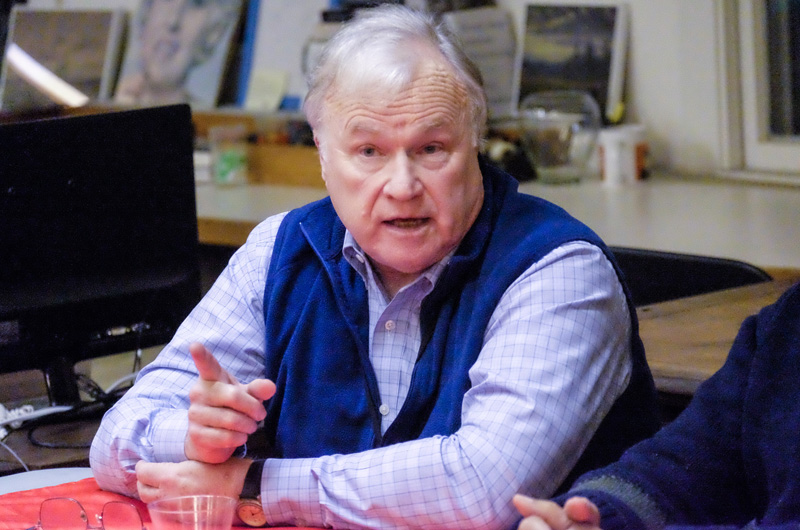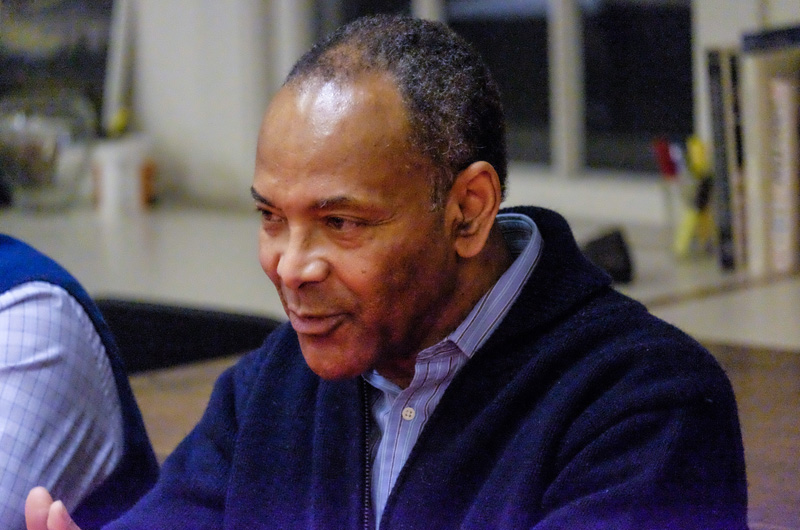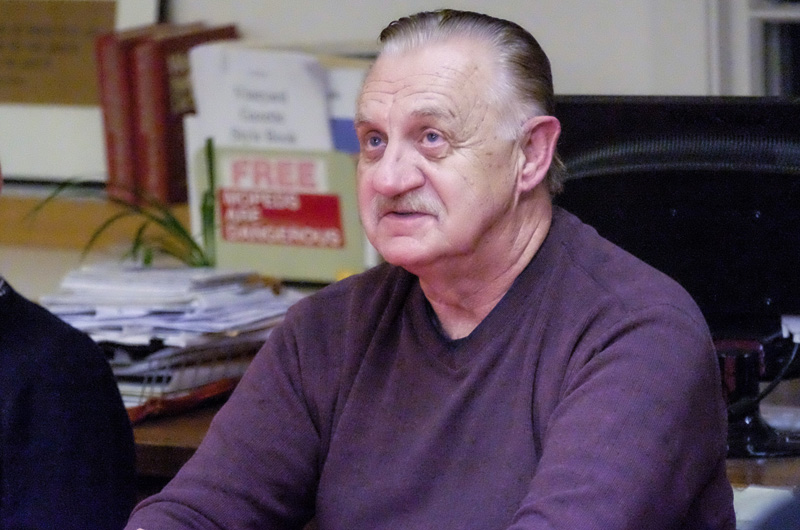Four Islanders who are Vietnam War veterans spoke frankly and movingly to a small but rapt gathering in the Gazette newsroom this week about their experiences in a war that carved deep divisions in the country and left permanent scars on those who served.
It was an evening of history, vivid storytelling and reflection, self-deprecating humor and solemnity. And while the four veterans acknowledged bluntly that they were never properly welcomed home, they said the result is a stronger support network for veterans today.
“If you haven’t been to war, you’re lucky. The things you see and do,” said Jim Bishop, a former combat veteran who lives in Oak Bluffs.
Mr. Bishop was one of the four featured speakers, along with Tom Bennett, Gregory Spain and William Stafursky. The event was part of the Gazette’s Tuesday in the Newsroom series.
Gazette publisher Jane Seagrave moderated the discussion. The room fell silent as each vet in turn recounted his service.
All four were under 21 when they enlisted in the late 1960s. “Not even old enough to vote,” Ms. Seagrave said. All went to Vietnam early in the war. All lost friends there. Two were injured and returned home. One returned for a second tour. All know their history intimately and have seen the movies about Vietnam, including the recent Ken Burns/Lynn Novick documentary series. And all agreed that it only scratched the surface of the war that America is still struggling to comprehend 40 years after it ended.

Tom Bennett grew up in Edgartown and was educated in Vineyard schools. He wanted to go to college but his family lacked the financial resources. He had an uncle who had been in the service, so he decided to join the Air Force.
He went for basic training at Lackland Air Force Base in San Antonio, Tex., and then traveled by train to a base in Gunther, Ala.,. for medical training. He described the train ride from Texas to Alabama — an Island boy seeing the segregation of the South up close for the first time. “There were separate bathrooms for people who were black and white,” he said, recounting his experience going into a cafeteria going and finding he was in the wrong one. “I was stunned,” he recalled. The Martin Luther King Jr. march from Selma to Montomgery took place while he was at Gunther, opening his eyes even further to the tumultuous days at the height of the civil rights movement.
He went to work as a medic, beginning at Andrews Air Force base where he was assigned to the air evacuation unit. He was working that unit when the first two major battles of the war took place. He helped bring the wounded off planes and to the major military hospitals in the area. By the time he left, most of the hospitals were filled.
Mr. Bennett also later worked on hospital wards with some of the wounded, and ended his service as an independent duty medic stationed in Samsun, Turkey.
When he eventually returned home to the Vineyard in 1970, he knew he wanted to do something to help better the lives of people in the community. He began working for two Vineyard psychiatrists at Martha’s Vineyard Community Services. That year he encountered a U.S. Marine and Vietnam veteran who was suffering from PTSD. It was the start of a 47-year career working with veterans that continues today in his role as associate executive director at Community Services.

Gregory Spain grew up in the projects in Philadelphia. He came from a line of military family members and knew by the age of eight that he wanted to be a Marine. “I wanted to be in the best,” he said. He enlisted at 17. He spoke humorously about the legendary boot camp at Parris Island: “I programmed myself into believing that it was a game,” he said. “I wasn’t going to let them win.” He was first deployed to a one-month rebellion in Santa Domingo, and later returned to the States for more training in what he knew was a stepping stone to Vietnam.
He became part of the first battalion, 26th Marines, an amphibious unit that made landings in hot spots. In September 1966 they went inland permanently and participated in several operations in South Vietnam and along the DMZ. He fought in Dong Ha and Da Nang, among other places.
“Remember the tunnel rats? We were the precursor to the tunnel rats. We blew things up,” Mr. Spain said.
Later his best friend was killed. “We were all very tight,” Mr. Spain said. “It didn’t matter whether you were black or white or green or purple — that’s the way it was and the way it should be now. It was a privilege for me to be in Vietnam and to know such great men, even though we were boys.”
In February 1967 Mr. Spain was shot by a sniper and evacuated to a hospital in Guam. There he was promoted to sergeant and spent the remainder of his tour in Okinawa. He was there in April 1968 when he learned that Martin Luther King had been assassinated, and considered staying overseas. “I said, I’m not going back. I don’t know that place anymore.”
He lives in Vineyard Haven.

Bill Stafursky grew up in Greenfield in western Massachusetts. His father was a decorated World War II veteran, having served as Pathfinder of the 82nd Airborne Division. He dropped out of junior college in 1967, knew he was going to be drafted and decided to enlist. He joined the Army Military Police, thinking that down the road when he returned home he would get involved in the juvenile justice system in Greenfield. He did basic training in Fort Dix, N.J. and went for advance training at Fort Gordon in Augusta, Ga. It was July. Although they weren’t told, “I knew where we were going, everybody knew where we were going,” Mr. Stafursky said. By August he was in Vietnam.
He vividly recalled the 100-degree-plus heat, learning to use mine sweepers, and traveling from north of Saigon to an outpost on the Cambodian border where bizarrely there was a Michelin rubber plantation with tennis courts and swimming pools. Meanwhile, they were getting shelled daily. “It was a constant fear of something happening every day,” he said. “I learned how to cut brakes — because over there you just went, you didn’t stop for anything.” He was injured during a convoy operation and taken to a hospital in Japan for treatment. From there he was sent home to a hospital outside Boston.
He recalled his mother coming into his hospital room engulfed in tears. It turned out the family had received a telegram from the Red Cross telling them their son had lost his legs.
He returned to Fort Dix to work on felony investigations and prisoner outreach, married and had a son. Following discharge he returned to Greenfield. A job was available for a juvenile officer in the police department. Mr. Stafursky was one of two applicants. Both had similar experience with one key difference: Mr. Stafursky was a Vietnam combat veteran. In the end the other guy got the job. “The board of selectmen ordered the police chief not to hire a Vietnam veteran,” he recalled.
His wife was from the Vineyard, and it turned out at the time that Tony daRosa needed a printer at his Oak Bluffs printing company. The Stafurskys moved to the Island and stayed, and he worked at daRosa’s for 43 years. Two years ago he took a job as the veterans outreach coordinator at Martha’s Vineyard Community Services. “Best job I ever had,” he said.

Jim Bishop grew up in Worcester, dropped out of junior college and enlisted in 1967. He had such high test scores he was sent to San Diego for electronics repair and crypto school. He too had vivid memories of basic training. “Parris Island . . . you cross that bridge. I got off the bus and heard things I had never heard in my life,” he said. “You learn two things: you get in shape, and you learn the history and the honor of the Corps.”
He wanted to go to Vietnam and did, for two tours as a repairman/radio operator/squad leader. “I spent my first three months in a hole in the ground,” he recalled. “But if you know how to fix a radio you can lead a squadron.” In vivid terms he described the work of a war on the ground in the jungle, praising the medics, helicopter pilots and others who were the vital support network. He spoke bluntly about the defoliant Agent Orange. “They sprayed it on us, said it was okay. You could see it turn the jungle brown overnight . . .” He described friends who now suffer from severe lifelong disabilities.
“The one thing I can say about the Vietnam War was it took away America’s innocence when it comes to the United States government,” Mr. Bishop said. “That [Ken Burns] movie didn’t even touch it. There’s stuff we won’t talk about.”

As for whether the war was unwinnable, there were strong opinions.
Mr. Spain began with a reference to the Michael Cimino film Deer Hunter. “The roulette scene, that’s the scene probably everyone remembers . . . that was every one of us, we played the roulette every day.” He continued: “After Tet we were ready to give up but we had never lost a battle . . . but we lost a war. How does that work?”
Mr. Bishop agreed. “We dropped more ordnance in Vietnam than we did in World War II — because we would never waste a man. And thank God for air support . . . We had them beat after Tet . . . we had the war won.”
Mr. Bennett turned somber. “All the loss of life . . . what did we learn? Is a war worth having? If we are going to have a war we have to get behind the people in battle.”
The veterans also spoke of coming home to a divided country that was unwelcoming to returning servicemen. Even some veterans of World War II looked down on the Vietnam vets, they said.
“Most of us took off our uniforms at the airport,” Mr. Bennett recalled. “The way veterans were treated when they came back home, to me it caused more turmoil than the war itself.”
He also said: “Today that has changed. Vietnam veterans will not let that happen again.”
Answering a final question from Ms. Seagrave, most of the veterans said they would support mandatory national service.
“I think everyone should serve,” Mr. Spain said. “Everyone sits comfortably in their homes while over there men and women are in holes defending all that — so they could be free. I think [with national service] we would have a different attitude in this country.”
Mr. Bennett agreed.
“Just on this Island we lost four of our boys [in Vietnam],” he said. “I knew three of them. The trauma of war has affected generations of families. If we are going to go to war, we need to know what the hell we are doing.”
An earlier version of this story contained a caption identifying Tom Bennett as an Army medic. Mr. Bennett served in the Air Force as a medic.













Comments (7)
Comments
Comment policy »